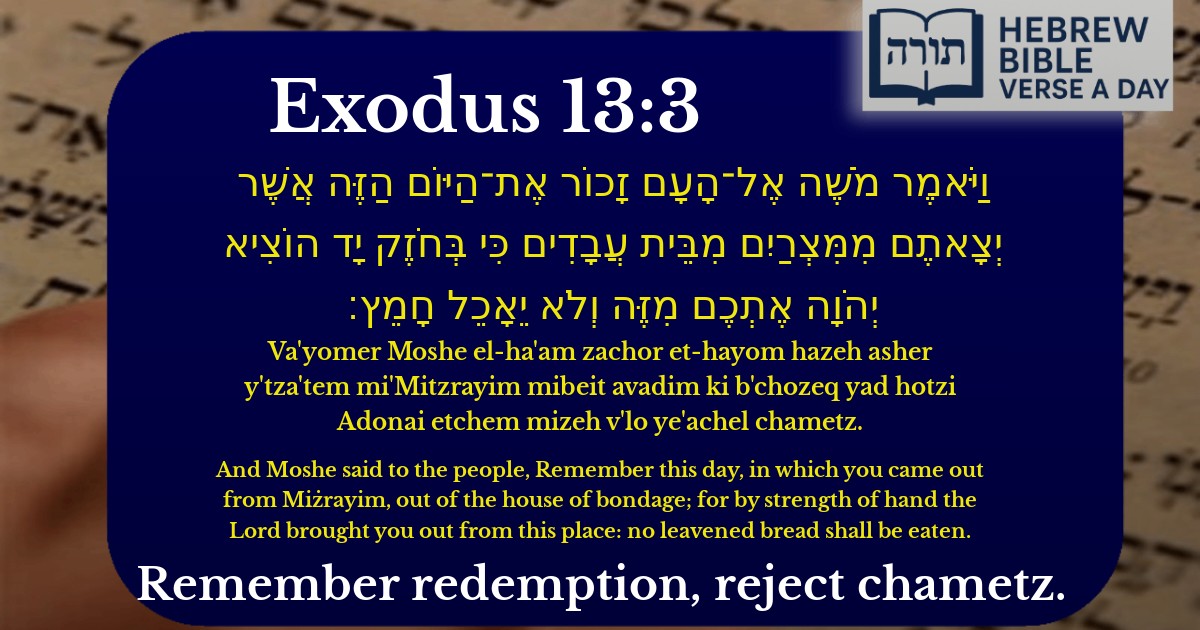Join Our Newsletter To Be Informed When New Videos Are Posted
Join the thousands of fellow Studends who rely on our videos to learn how to read the bible in Hebrew for free!
Hebrew Text
וַיֹּאמֶר מֹשֶׁה אֶל־הָעָם זָכוֹר אֶת־הַיּוֹם הַזֶּה אֲשֶׁר יְצָאתֶם מִמִּצְרַיִם מִבֵּית עֲבָדִים כִּי בְּחֹזֶק יָד הוֹצִיא יְהֹוָה אֶתְכֶם מִזֶּה וְלֹא יֵאָכֵל חָמֵץ׃
English Translation
And Moshe said to the people, Remember this day, in which you came out from Miżrayim, out of the house of bondage; for by strength of hand the Lord brought you out from this place: no leavened bread shall be eaten.
Transliteration
Va'yomer Moshe el-ha'am zachor et-hayom hazeh asher y'tza'tem mi'Mitzrayim mibeit avadim ki b'chozeq yad hotzi Adonai etchem mizeh v'lo ye'achel chametz.
Hebrew Leining Text
וַיֹּ֨אמֶר מֹשֶׁ֜ה אֶל־הָעָ֗ם זָכ֞וֹר אֶת־הַיּ֤וֹם הַזֶּה֙ אֲשֶׁ֨ר יְצָאתֶ֤ם מִמִּצְרַ֙יִם֙ מִבֵּ֣ית עֲבָדִ֔ים כִּ֚י בְּחֹ֣זֶק יָ֔ד הוֹצִ֧יא יְהֹוָ֛ה אֶתְכֶ֖ם מִזֶּ֑ה וְלֹ֥א יֵאָכֵ֖ל חָמֵֽץ׃
וַיֹּ֨אמֶר מֹשֶׁ֜ה אֶל־הָעָ֗ם זָכ֞וֹר אֶת־הַיּ֤וֹם הַזֶּה֙ אֲשֶׁ֨ר יְצָאתֶ֤ם מִמִּצְרַ֙יִם֙ מִבֵּ֣ית עֲבָדִ֔ים כִּ֚י בְּחֹ֣זֶק יָ֔ד הוֹצִ֧יא יְהֹוָ֛ה אֶתְכֶ֖ם מִזֶּ֑ה וְלֹ֥א יֵאָכֵ֖ל חָמֵֽץ׃
🎵 Listen to leining
Parasha Commentary
📚 Talmud Citations
This verse is quoted in the Talmud.
📖 Pesachim 116a
The verse is referenced in the discussion about the obligation to recount the Exodus from Egypt during the Passover Seder, emphasizing the importance of remembering the day of liberation from slavery.
📖 Berakhot 12b
The verse is cited in the context of discussing the recitation of the Shema and the inclusion of the Exodus narrative in daily prayers, highlighting the centrality of remembering the Exodus.


The Command to Remember Yetziat Mitzrayim
The verse begins with Moshe instructing Bnei Yisrael to "remember this day" of their exodus from Egypt. Rashi explains that this commandment is not merely about passive recollection, but about actively keeping the memory of Yetziat Mitzrayim at the forefront of one's consciousness. The Rambam (Hilchot Chametz U'Matzah 7:1) codifies this as a Torah obligation to recount the Exodus every day, as derived from this verse.
From Slavery to Freedom
The phrase "מִבֵּית עֲבָדִים" (from the house of bondage) emphasizes the transition from servitude to Pharaoh to becoming servants of Hashem. The Sforno notes that true freedom is not the absence of authority, but rather transferring one's allegiance from human masters to divine service. This concept is foundational to Jewish identity.
Divine Power in the Exodus
The mention of "בְּחֹזֶק יָד" (by strength of hand) refers to the miraculous nature of the redemption. The Mechilta explains this as referring to the ten plagues through which Hashem demonstrated His absolute power over nature and the false gods of Egypt. The Netziv adds that this phrase comes to counter any naturalistic explanations of the Exodus.
The Prohibition of Chametz
The concluding phrase "וְלֹא יֵאָכֵל חָמֵץ" (no leavened bread shall be eaten) connects the memory of the Exodus with the practical mitzvah of avoiding chametz. The Talmud (Pesachim 21b) derives from here the biblical prohibition against eating chametz on Pesach. The Ramban explains that chametz represents the yetzer hara (evil inclination) and slavery to material desires, while matzah symbolizes the haste of redemption and spiritual purity.
Key Lessons from the Verse